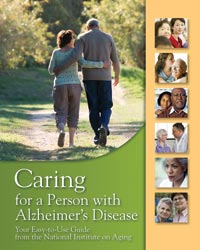
Since Jestene McCord's Alzheimer's disease was caught early, she has been an active participant in the planning for her future.
Photo: The Alzheimer's Association
Early Alzheimer's: "Stay Active!"
Jestene McCord suspected she was in the early stages of Alzheimer's disease (AD) even before being diagnosed. And she had no intention of sitting still for it.
For most of her career as a geriatric nurse and nurse administrator in Milwaukee, Jestene had cared for the elderly. Many of them had Alzheimer's disease. She didn't let those patients sit still for it, either. "I always believed—and taught my staff—you use it, or you lose it. So, I took my Alzheimer's patients places. I never let them sit around and feel sorry for themselves."
It was in 2008 that the 73-year-old retiree began noticing a few changes in her own life. "I needed more time and energy to get things done," she says. "I would have to put forth more energy to do something." She had also watched and helped as her grandmother, and then her mother, both went through Alzheimer's. She knew what to look for.
Jestene immediately consulted a specialist, and the doctor confirmed she was in the early stages of AD. Two years later, she's as active as ever. She stays socially engaged with her friends and keeps her two sons aware of everything going on and how she's doing. She's a volunteer with the Alzheimer's Association, and was chosen to be one of 10 members of an Early-Stage Advisory Group.
"I have a Palm Pilot, and everything is on the computer," she says. "All that helps, and I feel more comfortable having that." She and four of her senior friends even host an ongoing weekly radio talk show.
Because she had gone directly to a specialist when she suspected AD, she saved precious time. Alzheimer's experts say that many general practitioners can take from six months to two years to diagnose AD. Since early detection means that the patient can contribute to the conversation about his or her own treatment, delays in diagnosis can prevent that.
"So many family members are embarrassed and try to get their loved ones hidden away; they don't want anyone to know that mom or grandpa forgets," says Jestene. "There's nothing to be ashamed of; it doesn't happen because you're a lesser person. Stay as active as you can, and get a good support system."

Free Guide for Alzheimer's Caregivers
Caring for a person with Alzheimer's disease at home is a difficult task and can become overwhelming at times. Each day brings new challenges, as the caregiver copes with changing levels of ability and new patterns of behavior. Research has shown that caregivers themselves often are at risk for depression and illness if they don't receive adequate support from family, friends, and the community.
The National Institute on Aging (NIA) has created the Caring for a Person with Alzheimer's Disease guide for people who care for family members or others with Alzheimer's disease at home. The guide is meant to help caregivers learn about and cope with the many challenges of AD.
For copies of this book, contact the Alzheimer's Disease Education and Referral (ADEAR) Center, a service of the National Institute on Aging; Phone: 1-800-438-4380; www.nia.nih.gov/Alzheimers
Fast Facts
- Alzheimer's disease (AD) is a progressive brain disease that slowly destroys a person's memory, thinking skills, and the ability to perform simple, everyday tasks. In the final stage of AD, called Alzheimer's dementia, people are completely dependent on others for care.
- AD is the most common form of dementia among older people. Estimates vary, but experts suggest as many as 2.4 to 5.1 million Americans may have AD. In most cases, the first symptoms appear after age 60.
- About 5 percent of men and women ages 65 to 74 have AD, and nearly half of those age 85 and older are estimated to have the disease.
Researchers are seeking volunteers with AD and those free of the disorder for studies of possible treatments, including drugs and lifestyle interventions—like exercise—to see if they can delay or prevent the disease.
To Find Out More
To learn about support groups, services, research centers, research studies, and publications about AD, contact the following resources:
- National Institute on Aging's (NIA) Alzheimer's Disease Education and Referral (ADEAR) Center for answers to your questions, free publications, referrals to support organizations, Spanish-language resources, clinical trials, and more: www.nia.nih.gov/Alzheimers or toll-free 1-800-438-4380 (8:30 am–5:00 pm EST/EDT, Mon–Fri) or email to adear@nia.nih.gov or surface mail to ADEAR Center, P.O. Box 8250, Silver Spring, Md. 20907-8250
- A Listing of Clinical Trials, sponsored by the NIH, other federal agencies, and private industry: www.ClinicalTrials.gov
- NIH Senior Health: nihseniorhealth.gov/alzheimersdisease/toc.html
- The National Institute of Neurological Disorders and Stroke: www.ninds.nih.gov/disorders/alzheimersdisease/alzheimersdisease.htm
- National Institute of Mental Health: www.nimh.nih.gov
- MedlinePlus, a Service of the NIH and National Library of Medicine: http://medlineplus.gov
- Alzheimer's Association: www.alz.org
- Alzheimer's Foundation of America: www.alzfdn.org
- Fisher Center for Alzheimer's Research Foundation: www.alzinfo.org
- U.S. Administration on Aging's Eldercare Locator: www.eldercare.gov
